By Anne Locker
In October 2023, we celebrate Black History Month in the UK, and the theme this year is ‘Saluting our sisters.’ In this blog, we take a closer look at an album of photographs taken at a 1967 international conference of women engineers and scientists, from the archives of the Women’s Engineering Society (NAEST 092). This conference was attended by four extraordinary women who studied in the UK and went on to ground-breaking careers in Ghana, Nigeria and Uganda. These women were Dr Ebun Adegbohungbe, Dr Deborah Ajakaiye, Miriam Muwanga and Dr Letitia Obeng.
The conference
The second International Conference of Women Engineers and Scientists (ICWES) was held in Cambridge, UK, in July 1967. The first ICWES conference, held in the US and organised by the Society of Women Engineers, had been an astounding success, bringing together nearly 500 attendees from 35 countries. This second conference, organised by the Women’s Engineering Society in the UK, showcased an impressive programme of delegates and speaker from around the world, although many had connections to the UK. Some were at the beginning of their careers while others were already in positions of influence.
As well as the conference proceedings, the Women’s Engineering Society preserved an album of over 100 photographs taken at the conference, which shows how women from around the world came together to exchange information and support each other’s work.
The Electrifying Women project based at the University of Leeds has brought together resources on the early ICWES conferences and attendees and was the first project to look in detail at the lives of some of the early ICWES attendees. We would like to thank Dr Emily Rees, Professor Graeme Gooday and students and researchers at the University of Leeds who contributed to this research. Further links can be found at the end of this blog.
Ebun Adegbohungbe (Ebun Oni)
Ebun Adegbohungbe (later Ebun Oni) was born in 1935 in Ilesha, Nigeria. After attending the Methodist Girls High School in Lagos, she obtained a government scholarship to study mathematics and physics at the University College of Ghana in 1957. In 1960, on a further postgraduate scholarship, she moved to the UK to study at Imperial College London, where she was awarded a Diploma (DIC), MSc and, in 1967, a PhD in geophysics. Ebun returned to Nigeria to take a post at the University of Ife, later moving to the University of Ibadan.
In 1967, Adegbohungbe was studying in the UK but also preparing for her return to Nigeria. She attended the ICWES conference to give a paper on ‘Application of Physics to some Economic Problems in Nigeria.’ In her paper, Adegbohungbe looked at the challenges faced by agriculture and food supply in Nigeria, and emphasised the importance of industrial development to boost the economy.
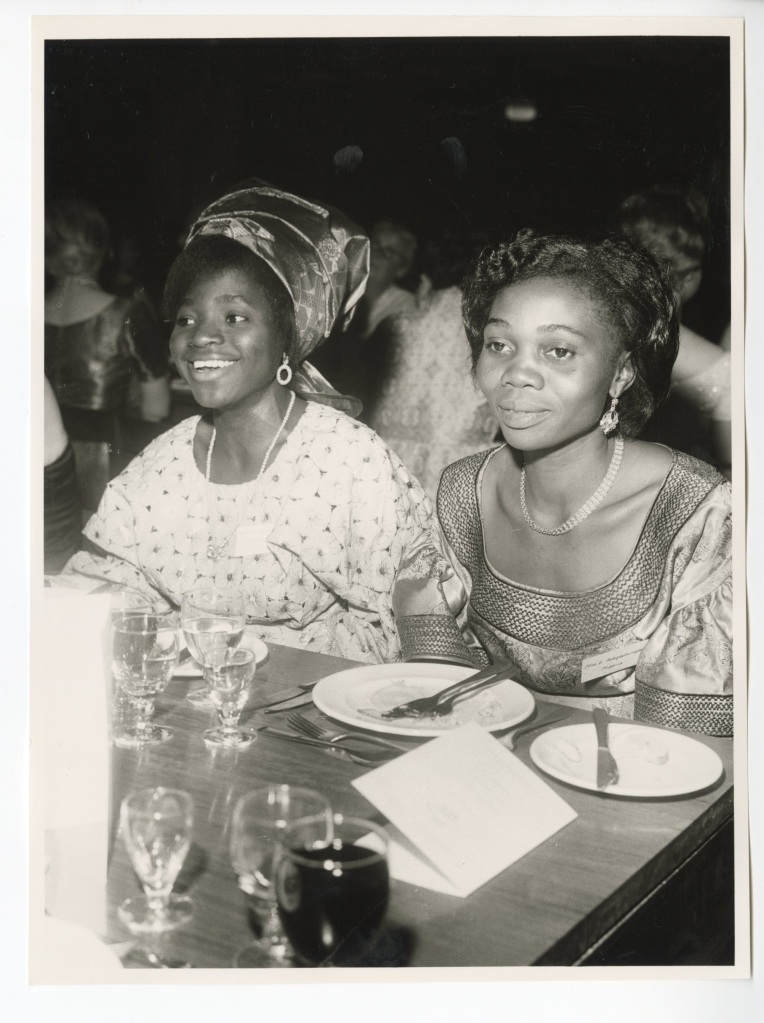
After her marriage, Dr Oni continued her involvement with ICWES by sitting on the organising committee, and in 1972 the conference was held at the University of Ibadan.
Dr Oni was known for her work on magnetometers and seismology, and in 1974 was awarded a Fulbright-Hayes travel grant to visit the US to work at the National Geophysical and Sola Terrestrial Data Centre. She became Head of the Physics Department at the University of Ibadan, where she founded the Solid Earth and Space Research Lab. She was a Fellow of the Nigerian Institute of Physics and Vice-President of the International Commission for Earth Sciences in Africa. Dr Oni retired from her university post in 2000, and died in 2021 at the age of 86.
Deborah Ajakaiye
The above photograph shows Ebun with her fellow Nigerian geophysicist, Dr Deborah Enilo Ajakaiye. Ajakaiye was born in Jos in 1940 and studied at the University of Ibadan for her undergraduate degree in physics. She also moved to the UK, obtaining an MSc from the University in Birmingham, but returned to Nigeria for her PhD. After completing her PhD at the Ahmadu Bello University in 1970, Ajakaiye stayed on as a lecturer. In 1980, she became the first woman in Africa to be appointed as a professor of physics.
Dr Ajakaiye presented greetings from Nigeria at the 1967 conference. At the third ICWES conference, held in Turin in 1971, she gave a paper on the situation of women scientists and engineers in Nigeria, sharing a programme with Grace Hopper and Letitia Obeng (see below).
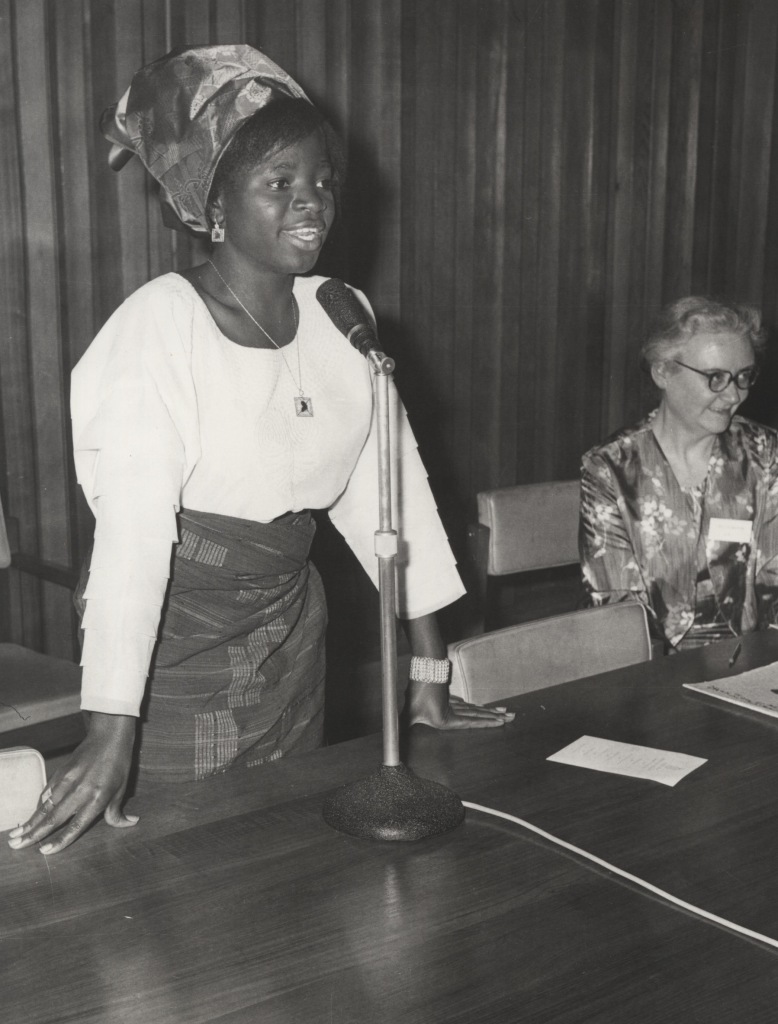
Dr Ajakaiye specialised in geovisualisation and contributed to Nigeria’s growing mining and geoscience industries. She was the first woman to receive an award from the Nigerian Mining and Geosciences Society and the first black African to be elected as an Honorary Fellow of the Geological Society of London. Ajakaiye also served as Regional President of the American Association of Petroleum Geologists (AAPM). In 2010, she was honoured at Nigeria’s 50th Independence Award for Women of Distinction.
Dr Ajakaiye retired in 1991 and founded the charity Christian Care for Widows, Widowers, the Aged and Orphans (CCWA).
Miriam Muwanga (Miriam Sebaggala)
In 1967, Miriam Muwanga was a student at the John Dalton College of Technology (later Manchester Metropolitan University) and was working as a trainee at AEI (later Metropolitan-Vickers). Unlike the other women we discuss here, she had not followed a scientific career but instead focused on practical engineering training, studying for a Higher National Certificate (HNC) in engineering. Ebun Oni recalled that she had wanted to study engineering but could only get a scholarship to study physics, so Muwanga must have been determined in her choice of career.
Muwanga was awarded funding from the Caroline Haslett Memorial Trust so she could attend the 1967 ICWES conference and appeared on stage at the opening ceremony.
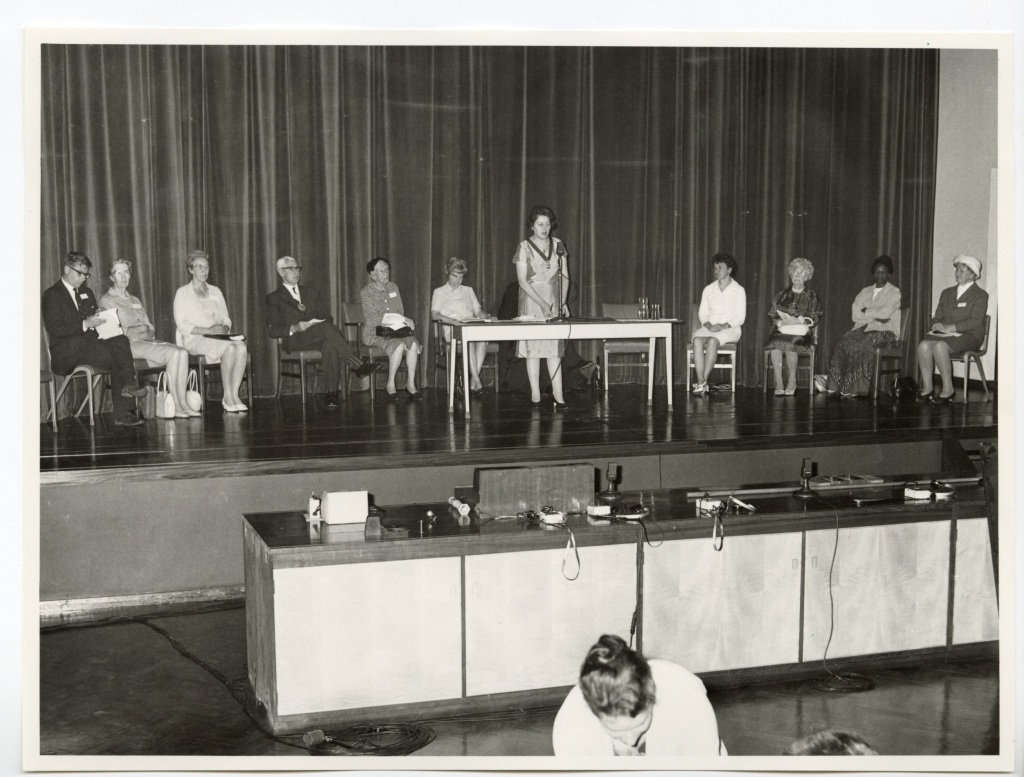
Miriam married in 1968 and returned to Uganda, where she founded the Women’s Technical Society of Uganda. She worked for the Uganda Electricity Board (UEB) as a design assistant and helped set up an Institution of Engineering Technicians. She became editor of the UEB Journal in 1974, after another period of study in the UK. Sadly, in 1975 it was announced that she had died in a car accident.
Miriam Muwanga joined the Women’s Engineering Society in 1965 and regularly contributed news of engineering developments in Uganda. Her obituary stated that “Uganda has lost its first woman engineer”, and that:
Miriam had a great desire to give herself to help others and especially to help her country and her people. To this end she chose engineering instead of the accepted nursing and travelled to England where she worked exceptionally hard for suitable qualifications … Her death is a dreadful tragedy, an appalling waste of a wonderful, brilliant young life.
The Woman Engineer vol. 11 no. 16
Letitia Obeng
Letitia Obeng was born in 1925 in Anum, Ghana, and attended secondary school at Achimota College. She came to the UK in 1948 to study at the University of Birmingham, where she gained her BSc in zoology and MSc in parasitology, before returning to Ghana to work at the Kwame Nkrumah University of Science and Technology.
In 1959, Obeng’s husband, a lecturer at the university, sadly died. Obeng, with her three young children, returned to the UK to study for a PhD at the Liverpool School of Tropical Medicine. She had been the first woman in Ghana to be awarded a BSc and would also be the first to gain a PhD. Her doctorate focused on the transmission of river blindness by black flies and was awarded in 1964.
A year later, Ghana’s Volta Dam was finally completed: a hydroelectric project that created the world’s largest man-made lake. With her expertise on the links between water and population health, Obeng lobbied the government to create the Institute of Aquatic Biology in Ghana, which would study the impact of the scheme. The Institute was duly set up and Obeng led its work. More firsts followed: she was the first woman to be elected a Fellow of the Ghana Academy of Arts and Sciences, and the first woman to serve as the Academy’s President.
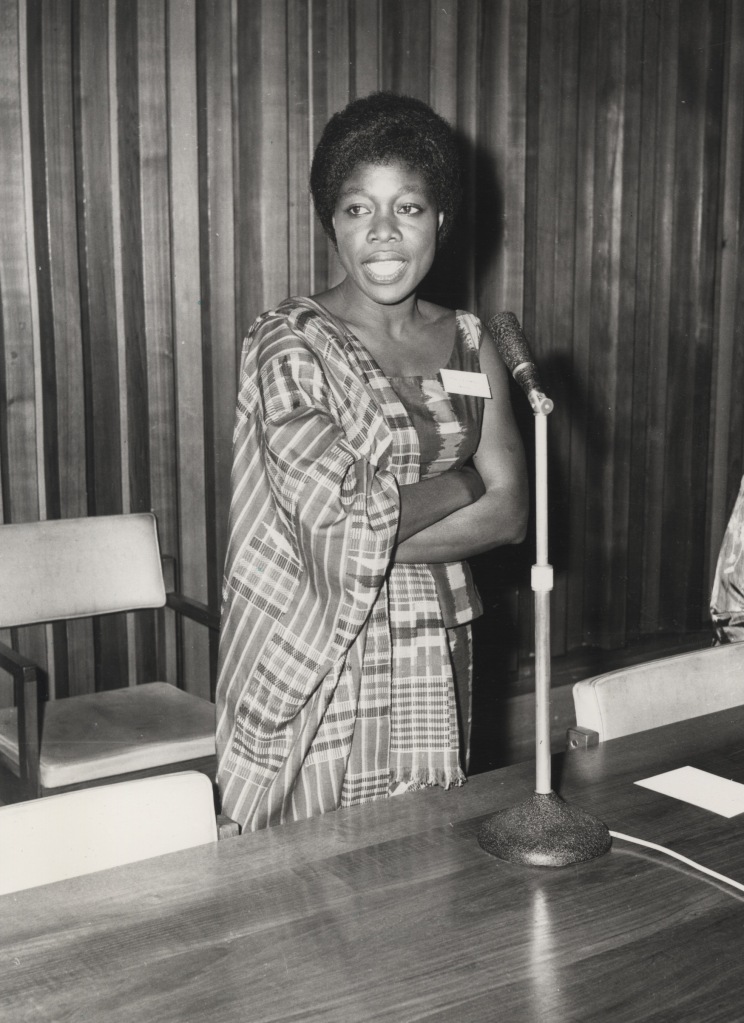
Dr Obeng gave a greeting to the 1967 ICWES conference as the representative from Ghana and spoke on the subject of man-made lakes. She wrote an account of the conference banquet for The Woman Engineer saying:
The presence together of women engineers and scientists, the very young and the very old, the attention they paid to the brilliant and important banquet speeches flavoured here and there by snatches of Gaelic, Irish and Hindi … breaking barriers such as only women can break … will go a long way beyond the objective of the banquet and accomplish much more that is good for the world
The Woman Engineer
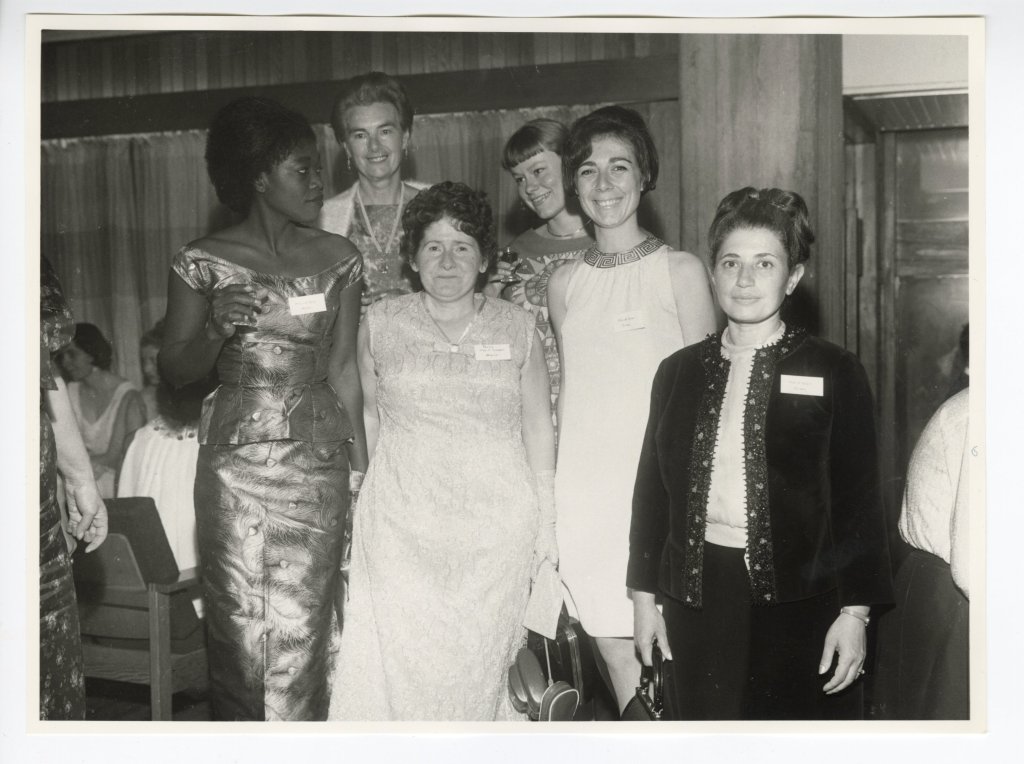
Dr Obeng’s international activities did not end with ICWES. In 1974 she started working for the United Nations Environment Programme as Officer in Charge of Water and Soil, and became regional Director of UNEP in 1980.
In recognition of her achievements, Dr Obeng was awarded the Order of the Star of Ghana in 2006. She died in 2023 at the age of 98.
Conclusion
The work of these four women, who happened to attend the same conference in 1967, is astonishing. But more research is needed. Little is known about Miriam Muwanga, Uganda’s first woman engineer, beyond the information in the Women’s Engineering Society journal. Even the contributions of Dr Obeng, Dr Ajakaiye and Dr Oni are not well known outside of their fields. If anyone knows of further resources on these amazing women and their careers, please get in touch.
Links and further reading
Who went to the International Conference of Women Engineers and Scientists (ICWES) in 1964 and 1967?
Online access to The Woman Engineer
Ebun Adegbohungbe
Ebun Adefunmilayo Oni, (1935 – 2021) – ForeverMissed.com Online Memorials
Dr Deborah Ajakaiye
Miriam Muwanga
“Uganda has lost its first woman engineer”: Remembering Miriam Sebaggala (née Muwanga)
Dr Letitia Obeng